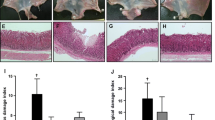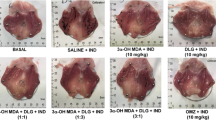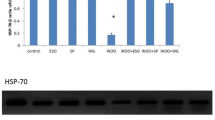It has been proposed that tissue damage induced by nonsteroidal anti-inflammatory drugs is related to increased tissue free radical production with antioxidant depletion. We have shown that esomeprazole increases gastric total antioxidant capacity in mice and, therefore, hypothesized that the protective effect of esomeprazole during treatment with a nonsteroidal anti-inflammatory drug is related to increased gastric antioxidant capacity and decreased tissue free radical production. A/J mice received one of four treatments by daily gavage: saline in vehicle (control), indomethacin, esomeprazole, or indomethacin and esomeprazole. After 10 days, all mice were sacrificed and validated assays were used to measure gastric total antioxidant capacity, lipid peroxide levels, and myeloperoxidase activity. Indomethacin-treated mice developed weight loss and melena. No mice receiving indomethacin and esomeprazole died, but the death rate while receiving indomethacin was 38% (χ2, P = 0.05). Gastric lipid peroxide levels increased in mice receiving indomethacin treatment compared to treatment with esomeprazole and indomethacin (P = 0.03). There was a strong trend (P = 0.08) toward increased gastric total antioxidant capacity in mice receiving esomeprazole and indomethacin compared to mice receiving indomethacin. Gastric myeloperoxidase activities were not different among the four groups. Esomeprazole significantly improved survival in mice that received indomethacin, reduced free radical production, as estimated by lipid peroxide levels, and appeared to increase gastric total antioxidant capacity. The mechanisms for the beneficial effects of esomeprazole in the treatment of gastropathy are more complex than previously thought.
Similar content being viewed by others
References
Koch TR, Yuan L-X, Petro A, Opara EC: Effects of omeprazole and ascorbate on gastric emptying and anti-oxidant levels in a mouse model of glutathione depletion. Dig Dis Sci 47(11):2486–2492, 2002
Koch TR, Petro A, Darrabie M, Opara EC: Effect of the H, K-ATPase inhibitor, esomeprazole magnesium, on gut total antioxidant capacity in mice. J Nutr Biochem 15:520–524, 2004
Lapenna D, de Gioia S, Ciofani G, et al. : Antioxidant properties of omeprazole. FEBS Lett 382:189–192, 1996
Kawamura T, Miyaji C, Toyabe S, et al. : Suppressive effect of antiulcer agents on granulocytes-a role for granulocytes in gastric ulcer formation. Dig Dis Sci 45:1786–1791, 2000
Wandall JH: Effects of omeprazole on neutrophil chemotaxis, super oxide production, degranulation, and translocation of cytochrome b-245. Gut 33:617–621, 1992
Suzuki M, Mori M, Miura S, et al. : Omeprazole attenuates oxygen-derived free radical production from human neutrophils. Free Radical Biol Med 21:727–731, 1996
Biswas K, Bandyopadhyay U, Chattopadhyay I, et al. : A novel antioxidant and antiapoptotic role of omeprazole to block gastric ulcer through scavenging of hydroxyl radical. J Biol Chem 278:10993–11001, 2003
Yoshikawa T, Naito Y, Kishi A, et al. : Role of active oxygen, lipid peroxidation, and antioxidants in the pathogenesis of gastric mucosal injury induced by indomethacin in rats. Gut 34:732–737, 1993
Hassan A, Martin E, Puig-Parellada P: Role of antioxidants in gastric mucosal damage induced by indomethacin in rats. Methods Find Exp Clin Pharmacol 20:849–854, 1998
Sener-Muratoglu G, Paskaloglu K, Arbak S, et al. : Protective effect of famotidine, omeprazole, and melatonin against acetylsalicyclic acid-induced gastric damage in rats. Dig Dis Sci 46:318–330, 2001
Carlsson E, Larsson H, Mattsson H, Ryberg B, Sundell G: Pharmacology and toxicology of omeprazole with special reference to the effects on the gastric mucosa. Scand J Gastroent 21(Suppl 118):31–38, 1986
Pellegrini N, Re R, Yang M, et al. : Screening of dietary carotenoids and carotenoids-rich fruit extracts for antioxidant activities applying 2,2′-azinobis(3-ethylenebenzothiazoline-6-sulfonic acid radical cation decolorization assay. Methods Enzymol 299:379–389, 1998
Koch TR, Yuan L-X, Stryker SJ, Ratliff P, Telford GL, Opara EC: Total antioxidant capacity of colon in patients with chronic ulcerative colitis. Dig Dis Sci 45:1814–1819, 2000
Abdella N, Al Awadi F, Salman A, et al. : Thiobarbituric acid test as a measure of lipid peroxidation in Arab patients with NIDDM. Diabetes Res 15:173–177, 1990
Ballard TC, Farag A, Branum GD, et al. : Effect of L-glutamine supplementation on impaired glucose regulation during intravenous lipid administration. Nutrition 12:349–354, 1996
Palmer JM, Koch TR: Altered neuropeptide content and cholinergic enzymatic activity in the inflamed guinea pig jejunum during parasitism. Neuropeptides 18:287–297, 1995
Castro GA, Roy SA, Stockstill RD: Trichinella spiralis: Peroxidase activity in isolated cells from the rat intestine. Exp Parasitol 36:307–315, 1974
Ruan EA, Rao S, Burdick JS, Stryker SJ, Telford GL, Otterson MF, Opara EC, Koch TR: Glutathione levels in chronic inflammatory disorders of the human colon. Nutr Res 17:463–473, 1997
Lang CA, Naryshkin S, Schneider DL, et al. : Low blood glutathione levels in healthy aging adults. J Lab Clin Med 120:720–725, 1992
Bicheler V, Cherbut C, Ropert A, et al. : Peptide YY increases gastric emptying in rats. Gastroenterology 114(4):A721, 1998
Matsuda M, Aono M, Moriga M, et al. : Centrally administered neuropeptide Y (NPY) inhibits gastric emptying and intestinal transit in the rat. Dig Dis Sci 38:845–850, 1993
Galunska B, Marazova K, Tankova T, et al. : Effects of paracetamol and propacetamol on gastric mucosal damage and gastric lipid peroxidation caused by acetylsalicyclic acid (ASA) in rats. Pharmacol Res 46:141–147, 2002
Pohle T, Brzozowski T, Becker JC, et al. : Role of reactive oxygen metabolites in aspirin-induced gastric damage in humans: Gastroprotection by vitamin C. Aliment Pharmacol Ther 15:677–687, 2001
Jaarin K, Gapor MT, Nafeeza MI, et al. : Effect of various doses of palm vitamin E and tocopherol on aspirin-induced gastric lesions in rats. Int J Exp Pathol 83:295–302, 2002
Singh P, Bhargava VK, Garg SK: Effect of melatonin and beta-carotene on indomethacin induced gastric mucosal injury. Indian J Physiol Pharmacol 46:229–234, 2002
Nafeeza MI, Fauzee AM, Kamsiah J, et al. : Comparative effects of a tocotrienol-rich fraction and tocopherol in aspirin-induced gastric lesions in rats. Asia Pac J Clin Nutr 11:309–313, 2002
Sugimoto N, Yoshida N, Yoshikawa T, et al. : Effect of vitamin E on aspirin-induced gastric mucosal injury in rats. Dig Dis Sci 45:599–605, 2000
Parmar NS, Tariq M, Ageel AM: Gastric anti-ulcer and cytoprotective effect of selenium in rats. Toxicol Appl Pharmacol 92:122–130, 1988
Al-Moutairy AR, Tariq M: Effect of vitamin E and selenium on hypothermic restraint stress and chemically-induced ulcers. Dig Dis Sci 41:1165–1171, 1996
Zahavi I, Fisher S, Marcus H, et al. : Oxygen radical scavengers are protective against indomethacin-induced intestinal ulceration in the rat. J Ped Gastroenterol Nutr 21:154–157, 1995
Bandyopadhyay B, Bandyopadhyay SK: Protective effect of zinc gluconate on chemically induced gastric ulcer. Indian J Med Res 106:27–32, 1997
Herrerias JM, Esteban JM, Caballero-Plasencia AM, et al. : Preventive effect of zaprinast and 3-isobutyl, 1-methylxanthine (phosphodiesterase inhibitors) on gastric injury induced by nonsteroidal anti-inflammatory drugs in rats. Dig Dis Sci 48(5):986–991, 2003
Zaror-Behrens G, Greselin E, Madere R, et al. : Vitamin E levels in gastric mucosa and indomethacin-induced gastric lesions in rats. Res Commun Chem Pathol Pharmacol 75:185–192, 1992
Stickel F, Meydani M, Wu D, et al. : Effect of vitamin E supplementation on prostaglandin concentrations in aspirin-induced acute gastric injury in aged rats. Am J Clin Nutr 66(5):1218–1223, 1997
McAlindon ME, Muller AF, Filipowicz B, et al. : Effect of allopurinol, sulfasalazine, and vitamin C on aspirin induced gastroduodenal injury in human volunteers. Gut 38:518–524, 1996
Shea-Donohue T, Steel L, Montcalm-Mazzilli E, et al. : Aspirin-induced changes in gastric function: Role of endogenous prostaglandins and mucosal damage. Gastroenterology 98:284–292, 1990
Corak A, Coskun T, Alican I, et al. : The effect of nitric oxide synthase blockade and indomethacin on gastric emptying and gastric contractility. Pharmacology 54:298–304, 1997
Kechagias S, Jonsson KA, Norlander B, et al. : Low-dose aspirin decreases blood alcohol concentrations by delaying gastric emptying. Eur J Clin Pharmacol 53:241–246, 1997
Rinetti M, Ugolotti G, Calbiani B, et al. : Antiinflammatory drugs and gastric emptying. A comparison between acetylsalicyclic acid and carprofen. Arzneimittelforschung 32:1561–1563, 1982
Kulkarni SG, Parikh SS, Shankhpal PD, et al. : Gastric emptying of solids in long-term NSAID users: Correlation with endoscopic findings and Helicobacter pylori status. Am J Gastroenterol 94:382–386, 1999
Slomiany BL, Piotrowski J, Slomiany A: Role of endothelin-1 and constitutive nitric oxide synthase in gastric mucosal resistance to indomethacin injury: Effect of antiulcer agents. Scand J Gastroenterol 34:459–464, 1999
Chandranath SI, Bastaki SM, Singh J: A comparative study on the activity of lansoprazole, omeprazole, and PD-136450 on acidified ethanol-and indomethacin-induced gastric lesions in the rat. Clin Exp Pharmacol Physiol 29:173–180, 2002
Van den Berg R, Haenen GRMM, Van den Berg H, et al. : Applicability of an improved Trolox equivalent antioxidant capacity measurements of mixtures. Food Chem 66:511–517, 1999
Mowat C, Carswell A, Wirz A, et al. : Omeprazole and dietary nitrate independently affect levels of vitamin C and nitrite in gastric juice. Gastroenterology 116:813–822, 1999
Martensson J, Jain A, Meister A: Glutathione is required for intestinal function. Proc Natl Acad Sci USA 87:1715–1719, 1990
Zhang R, Brennan ML, Shen Z, et al. : Myeloperoxidase functions as a major enzymatic catalyst for initiation of lipid peroxidation at sites of inflammation. J Biol Chem 277(48):6116–6122, 2002
Thomson RD, Lestina LS, Bensen SP, et al. : Lansoprazole-associated microscopic colitis: A case series. Am J Gastroenterol 97:2908–2913, 2002
Mukherjee S: Diarrhea associated with lansoprazole. J Gastroenterol Hepatol 18(5):602–603, 2003
Author information
Authors and Affiliations
Corresponding author
Rights and permissions
About this article
Cite this article
Koch, T.R., Petro, A., Darrabie, M. et al. Effects of Esomeprazole Magnesium on Nonsteroidal Anti-Inflammatory Drug Gastropathy. Dig Dis Sci 50, 86–93 (2005). https://doi.org/10.1007/s10620-005-1283-z
Received:
Accepted:
Issue Date:
DOI: https://doi.org/10.1007/s10620-005-1283-z




